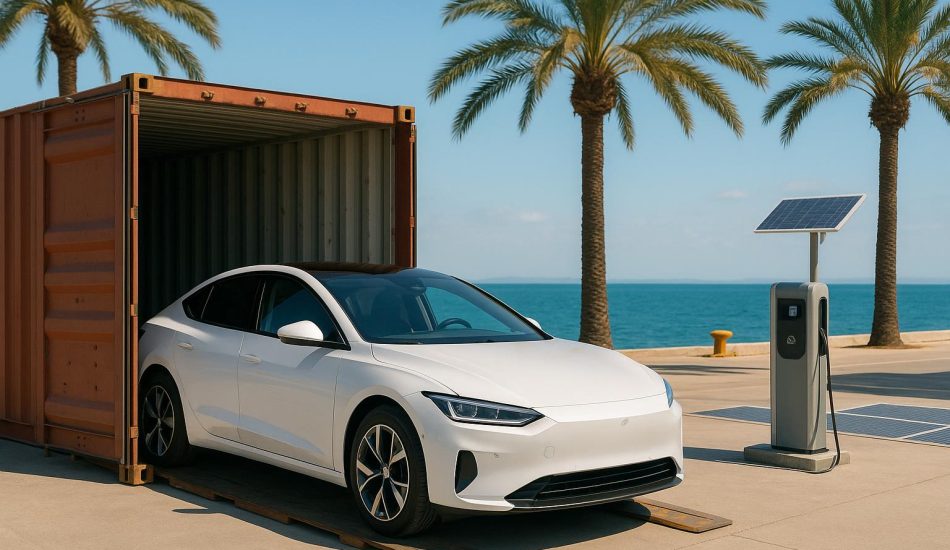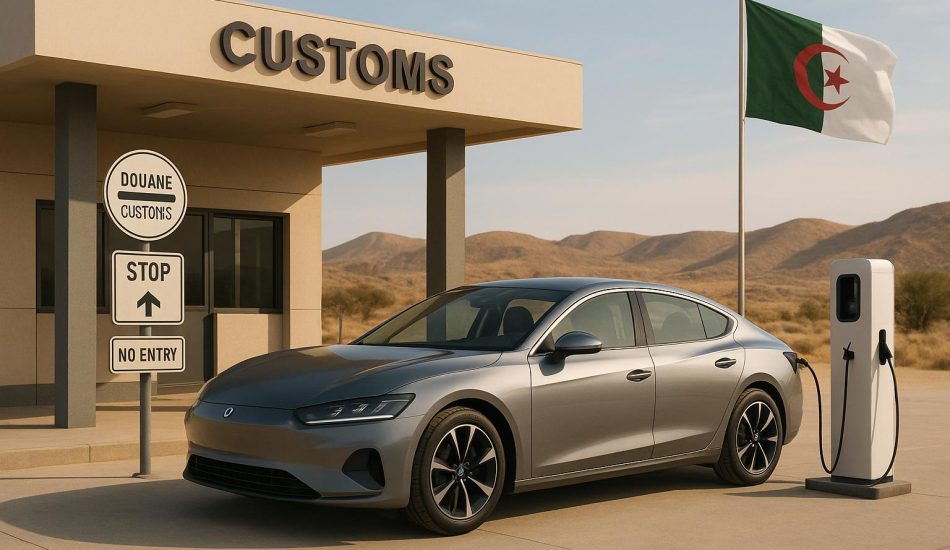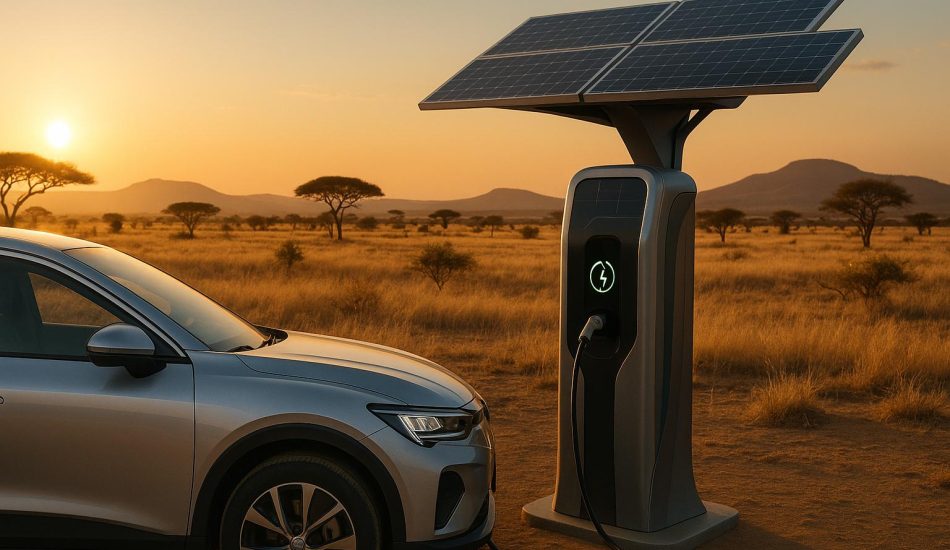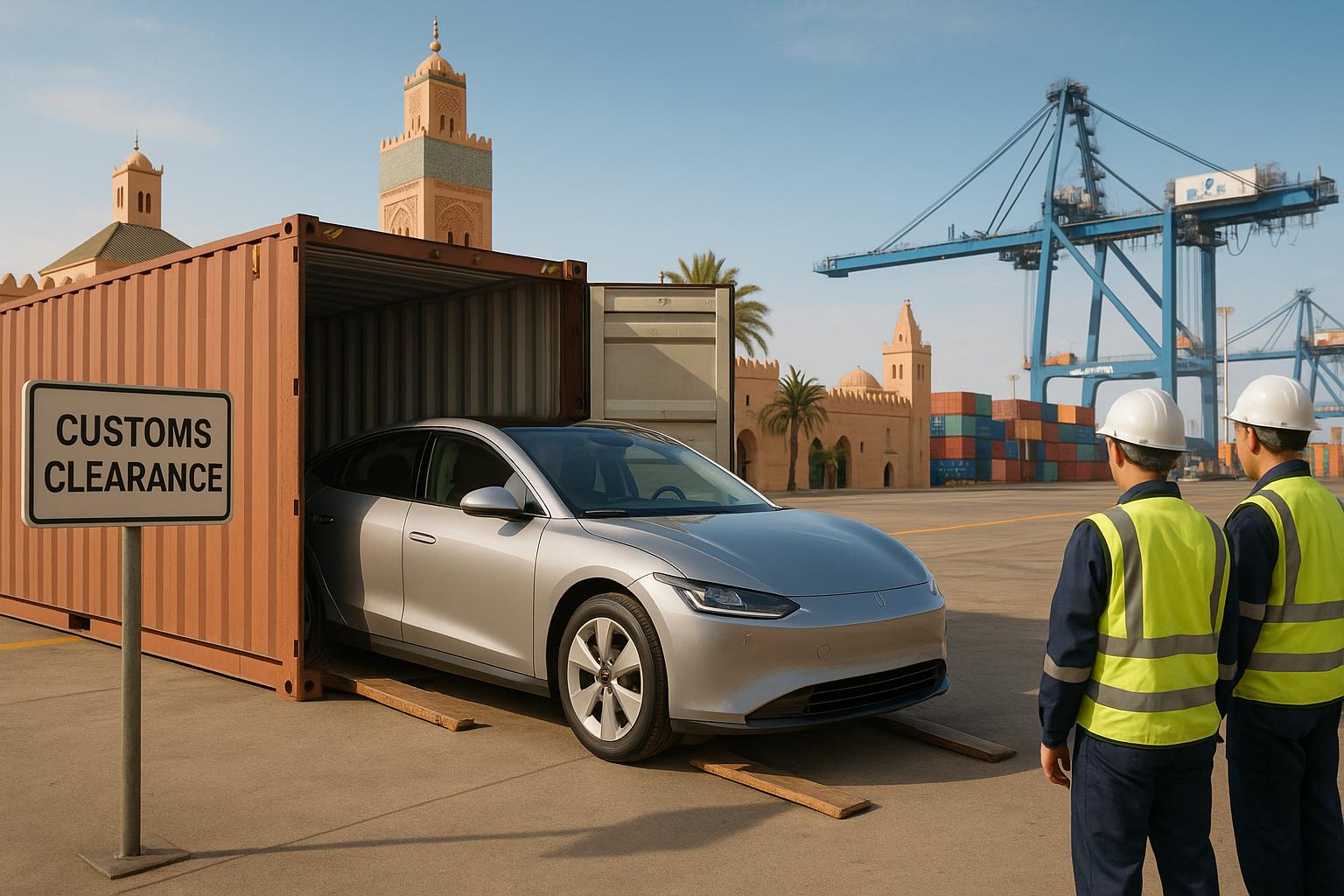
Importing electric vehicles (EVs) to Morocco in 2025 just got much easier and cheaper. New rules aim to boost EV adoption and local production while supporting Morocco’s green energy goals. Here’s what you need to know:
- Lower Import Costs: EVs are now exempt from VAT (0%) and customs duties, drastically reducing prices. For example, a $30,000 EV now incurs only $750 in duties compared to $11,000+ for regular cars.
- Simplified Import Process: Required documents include registration papers, proof of ownership, and compliance certificates. Vehicles must meet safety and technical standards.
- Government Incentives: Moroccan nationals abroad benefit from up to 90% tax reductions on imported EVs. EV owners also save on annual circulation taxes, further cutting costs.
- Big Goals for EV Growth: Morocco plans to produce 100,000 EVs by 2025 and increase EV exports to 60% of its automotive output by 2030. Charging stations will grow from 1,000 to 3,500 by 2026.
These updates make EV ownership more affordable while supporting Morocco’s ambitions to lead in sustainable transportation and manufacturing. Keep reading for detailed steps on importing EVs, required paperwork, and compliance rules.
Tax Changes for EV Imports in 2025
Morocco has introduced a new tax framework for electric vehicle (EV) imports, making EVs more affordable for both importers and consumers.
Lower Import Duties for Electric Vehicles
One of the standout updates is the significant drop in customs duties for EVs. The rate has been slashed to just 2.5%, a sharp contrast to the 17% rate applied to most passenger vehicles. This adjustment is similar to the reduction granted to Japanese hybrid vehicles, which saw their duties decrease from 17.5% to 2.5%. Meanwhile, European diesel vehicles continue to benefit from a 0% duty under existing free trade agreements.
Tax Breaks and Exemptions
Morocco has also introduced additional incentives for EVs. Fully electric vehicles are now completely exempt from VAT and customs duties. This means EVs are subject to a 0% VAT rate, a significant departure from the usual 20% tax. On top of that, EV owners enjoy tax sticker exemptions, further reducing the costs associated with vehicle ownership.
Total Import Cost Changes
These policy changes bring substantial savings for EV buyers. For example:
- A $30,000 EV now incurs only $750 in duties.
- A $50,000 luxury EV pays just $1,250 in duties.
Compare this to the hefty $11,000–$18,500 in duties that conventional vehicles might face, and the savings become crystal clear.
These cost reductions have already had a noticeable impact. In 2024, Morocco’s EV market saw a 52% surge in sales, with 11,023 units sold, up from 7,251 in 2023.
Next, explore the necessary documents and compliance requirements to streamline your EV import process.
Required Documents and Compliance Rules
Importing an electric vehicle (EV) into Morocco involves gathering specific documents and following updated regulations. The customs administration provides an official online guide that outlines all the necessary steps and requirements.
Required Papers for EV Imports
The paperwork needed depends on whether you’re importing the vehicle temporarily or permanently.
For temporary imports, you’ll need two key documents: your vehicle’s V5C Vehicle Registration Document and your passport. The customs office will issue a temporary import form, which is essential for police checkpoints and when exporting the vehicle later.
Permanent imports, however, require a more extensive list of documents. These include:
- The original vehicle registration
- Moroccan ID or residence card
- Passport with an entry stamp
- Purchase invoice
- A certificate confirming the vehicle has no outstanding loans
Additionally, you’ll need a valid technical inspection report from the country of origin and an insurance certificate.
All imported industrial goods, including EVs, must comply with Moroccan regulations and standards. This compliance is ensured through the Product Conformity Assessment Program, managed by the Ministry of Industry and Trade. Vehicles originating from countries with control measures must also arrive with a Certificate of Conformity (CoC).
It’s a good idea to make multiple copies of every document and keep digital backups. This precaution can save you a lot of trouble if anything is misplaced during the process.
Once your paperwork is sorted, you’ll need to ensure the vehicle meets Morocco’s technical and safety standards.
Vehicle Requirements and Restrictions
Morocco’s updated regulations for 2025 include specific rules for imported EVs. One major change is the extension of vehicle age limits for retired Moroccan Residents Abroad (MREs), which now allows the import of vehicles up to 10 years old, instead of the previous limit of 5 years. This change makes importing EVs more accessible for returning residents.
Technical datasheets and the exporter’s proforma invoice are used to classify vehicles and determine whether they require inspection at the origin, destination, or qualify for exemption.
To comply with Moroccan regulations, all EVs must meet technical and safety standards. These requirements fall under the Product Conformity Assessment Program, which enforces Law 24-09 alongside Decree no. 02-212 and Decree no. 3873-13. These measures ensure vehicles align with local safety and environmental guidelines.
Understanding these rules can help you choose the right import process for your specific needs.
Temporary vs Permanent Import Options
Once your documents are ready, you’ll need to decide between temporary or permanent importation based on your residency and plans for the vehicle.
- Temporary importation allows you to use the vehicle for six months, with the option to renew without leaving Morocco.
- Permanent importation requires clearing customs ("dédouanement"), paying import taxes, and obtaining a "quitus douanier" to register the vehicle in Morocco. This process allows indefinite use of the vehicle without time restrictions.
| Import Type | Duration | Tax Requirements | Best For |
|---|---|---|---|
| Temporary | 6 months (renewable) | No import taxes | Testing residency plans |
| Permanent | Unlimited | Full import taxes due | Long-term residents |
Both Moroccan nationals (including MREs) and foreign nationals planning to settle in Morocco can import vehicles. If you’re unsure about staying long-term, opting for temporary admission lets you test the waters without a significant financial commitment.
When applying for temporary admission, it’s important to declare your intention to permanently import the vehicle later. This ensures that the necessary paperwork is in place if you decide to make the switch.
Keep in mind that overstaying the temporary admission period can lead to penalties of up to 20,000 dirhams. For permanent imports, you must declare the vehicle at customs upon arrival and inform the officer of your intent to complete the process.
Government Support Programs for EV Buyers
Morocco has introduced financial support initiatives aimed at making electric vehicles (EVs) more affordable and accessible. These programs are part of a broader national effort to position Morocco as a regional hub for EV production while promoting greener transportation options. They also complement earlier tax reforms by further lowering the costs associated with owning an EV.
Money-Saving Programs for Buyers
The Moroccan government has rolled out various tax incentives and exemptions to reduce the overall costs of EV ownership. Among these, one standout benefit is the annual circulation tax exemption. Since 2017, owners of hybrid and electric vehicles have been exempt from paying this tax, which applies to conventional cars. Depending on the vehicle, this exemption can save owners hundreds of dollars each year.
For Moroccan expatriates returning home, there are additional perks. Those who have lived abroad for at least ten years can benefit from a 90% reduction on taxes for imported vehicles and a three-year tax-age cut.
Another key policy is the progressive reduction of import duties on various types of vehicles, with electric and hybrid models receiving the most favorable terms. This initiative makes imported EVs more competitively priced compared to locally assembled options.
On the production side, companies involved in manufacturing or assembling EVs in Morocco enjoy tax breaks and incentives, which often lead to lower consumer prices. Under Morocco’s Investment Charter, all investors, including those in free zones like Tangier and Kenitra, benefit from tax exemptions during their first five years of operation.
EV vs Gas Car Benefits Comparison
Choosing an electric vehicle over a gasoline-powered car in Morocco comes with significant financial benefits, especially when factoring in government incentives. Here’s a comparison that highlights the cost advantages of EVs:
| Benefit Category | Electric Vehicles | Gasoline Vehicles |
|---|---|---|
| Import Duties | Completely exempt | Standard rates apply |
| VAT | Fully exempt | 20% VAT required |
| Annual Circulation Tax | Exempt since 2017 | Required annually |
| Fuel Costs | Lower electricity rates | Rising gasoline prices |
| Government Incentives | Multiple tax breaks available | Limited incentives |
Additionally, Morocco is working to expand its EV charging network. The government plans to increase the number of charging stations across the country from 1,000 to 3,500 by 2026. This growing infrastructure makes EV ownership more convenient and practical.
The combination of tax exemptions, reduced fuel costs, and the absence of circulation taxes gives EVs a significant financial edge over gasoline-powered cars. Over the lifespan of a vehicle, these savings can amount to thousands of dollars.
Morocco’s EV Growth Plans
Morocco’s ambitious EV initiatives align with earlier reforms aimed at boosting the sector. By 2030, the country aims for 60% of its automotive exports to be electric. This strategy positions Morocco as a key player in the global EV market.
The government is leveraging the country’s strategic location and abundant natural resources, such as phosphates, cobalt, and manganese, to attract international EV manufacturers. These efforts are already yielding results.
In September 2023, CNGR, a major producer of battery cathodes, announced a $2 billion investment in a joint venture with a Moroccan royal group.
To support both local and international investors, AMDIE provides market insights, while Regional Investment Centers (CRI) offer tailored financing options and incentives for EV-related projects. The government also facilitates investments through infrastructure upgrades, simplified regulations, and tax benefits.
Morocco’s commitment goes further by offering subsidies and land allocations for green hydrogen and EV initiatives, fostering an integrated ecosystem for sustainable transportation.
These comprehensive measures not only benefit EV buyers but also strengthen the entire EV industry in Morocco. As production scales up and charging infrastructure expands, the advantages for EV owners are set to grow even more.
sbb-itb-99e19e3
How to Follow EV Import Rules Successfully
Bringing an electric vehicle (EV) into Morocco involves careful planning and attention to detail. While the customs administration has made the process more straightforward, adhering to the correct steps is essential to avoid unnecessary delays or penalties.
Steps to Meet All Requirements
Start by checking your vehicle’s eligibility. Morocco’s Customs Administration has shared an updated official guide online as part of Operation Marhaba 2025. This guide outlines the latest provisions and is a must-read for understanding the specific requirements for your EV model.
Next, focus on organizing your documentation. This is where many importers stumble. Use a checklist to ensure every required document is in order, as missing paperwork can lead to delays. A common mistake is failing to declare the intention to permanently import the vehicle when first obtaining temporary admission.
Timing is critical, especially if you’re planning to use the retirement exemption. This benefit, available to Moroccans aged 60 and older who have lived abroad for at least 10 years, offers a 90% tax reduction on the vehicle’s new-state value. To qualify, the retired family member must be present during the customs declaration process.
Pay close attention to temporary admission rules to avoid penalties. A vehicle can only benefit from one temporary admission per year, even if another person drives it, unless the vehicle officially changes ownership. Missing deadlines can lead to penalties ranging from 1,000 DH to 10,000 DH.
Don’t overlook insurance and licensing requirements. Make sure your insurance policy covers Morocco during your stay and update your driver’s license and residency card as needed.
For Moroccans returning permanently, there’s an additional benefit: a three-year age reduction applied when calculating vehicle taxes and duties. This, combined with other exemptions, can lead to substantial savings. Once you’ve organized your steps, EV24.africa can assist with the logistics to make the process easier.
How EV24.africa Helps with EV Imports
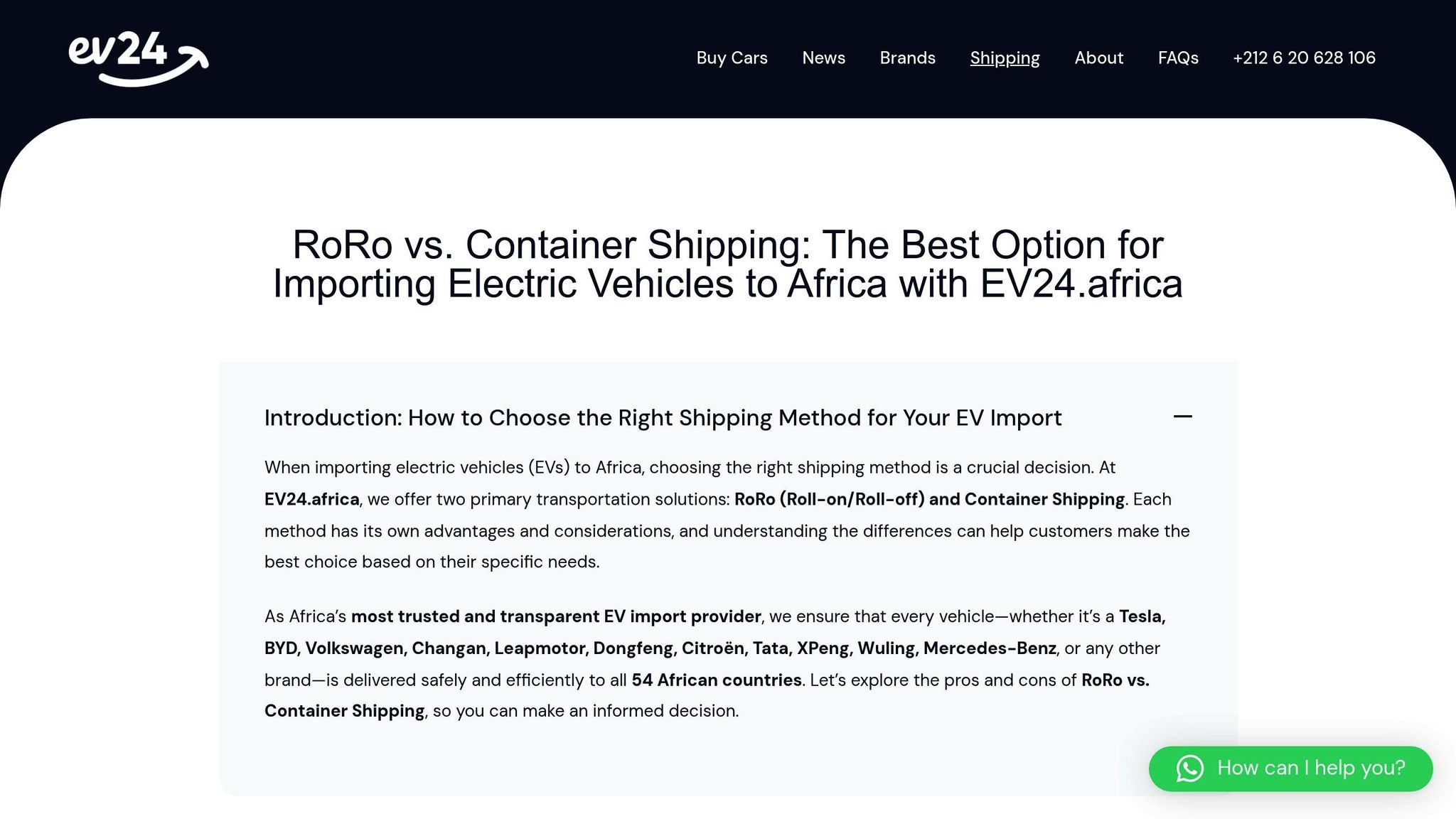
EV24.africa offers valuable assistance at every stage of the EV import process, particularly under Morocco’s updated 2025 regulations.
They help with choosing the right shipping method, whether it’s Roll-on/Roll-off (RoRo) or container shipping. This decision depends on your vehicle type, budget, and urgency, and their guidance ensures you select the most suitable and cost-efficient option.
With real-time tracking and updates, EV24.africa keeps you informed about your vehicle’s location throughout transit. This transparency allows you to prepare for customs and coordinate with officials, minimizing the risk of delays.
Their expertise also ensures compliance with international standards. They provide guidance on Incoterms like CIF (Cost, Insurance, and Freight) and DAP (Delivered at Place), clarifying the responsibilities of both buyers and sellers under Morocco’s import rules.
Through global logistics coordination, EV24.africa leverages its partnerships with customs and logistics providers to ensure smooth transit. Their commitment to transparent pricing means you’ll get a detailed cost breakdown upfront, helping you manage your budget and avoid unexpected charges.
Summary
Morocco is taking bold steps to reshape its transportation landscape with new regulations aimed at promoting electric vehicles (EVs) by 2025. Among the standout measures is the elimination of VAT and customs duties for fully electric vehicles, making EVs more affordable and accessible across the country’s market. These efforts align with Morocco’s ambitious targets: producing 100,000 EVs by 2025 and ensuring that 60% of automotive exports are EVs by 2030.
Additional tax incentives are also in place. Moroccan expatriates aged 60 and older who have lived abroad for at least 10 years can benefit from a 90% tax reduction. Meanwhile, returning nationals enjoy a three-year reduction in the age used for tax calculations.
For importers, the process has been streamlined but requires specific steps. They must register a legal entity, obtain an Importer Certificate from the Ministry of Industry and Trade, and submit customs declarations through the BADR portal. Key documents include commercial invoices, import commitments, certificates of origin, and proof of a commercial address. The customs administration has published an updated guide detailing these changes, which importers are encouraged to consult.
Morocco is also ramping up its EV infrastructure to support this transition, with plans to establish 2,500 charging stations by 2026. This initiative addresses one of the major barriers to EV adoption. Currently, just 0.04% of registered vehicles in Morocco are battery electric, highlighting the untapped potential for growth in this sector.
These developments are part of Morocco’s larger sustainability and economic goals. The country aims to source 52% of its energy from renewable resources by 2030. Its automotive sector, which produced 570,000 vehicles in 2023 – 80% of which were exported to Europe – is strategically positioned to thrive in the global shift toward EVs.
FAQs
What documents do I need to import an electric vehicle into Morocco in 2025, and how can I comply with the new regulations?
To bring an electric vehicle into Morocco in 2025, you’ll need to have some critical paperwork ready. These include a commercial invoice, an export certificate, the original bill of lading or airway bill, and a certificate of conformity obtained through the PORTNET platform. Each of these documents plays a vital role in clearing customs and meeting regulatory requirements.
Additionally, make sure the vehicle complies with Morocco’s updated safety and environmental standards. You’ll also need to secure an import permit from the Department of Commerce and carefully follow the country’s certification and customs procedures. Being well-prepared with these steps can help you avoid unnecessary delays and keep the process running smoothly.
What tax benefits and incentives will electric vehicles have in Morocco compared to gasoline or diesel vehicles under the 2025 import rules?
Starting in 2025, Morocco is rolling out updated import rules that could make electric vehicles (EVs) much more appealing to buyers. Under these new regulations, EVs will be completely exempt from VAT and customs duties, slashing their upfront costs. For comparison, traditional gasoline or diesel vehicles can face import tariffs as high as 40%. On top of that, EVs in certain zones will enjoy a five-year corporate tax exemption, creating even more financial incentives to make the switch.
Meanwhile, gasoline and diesel vehicles will continue to carry a heavier financial burden. They’ll still be subject to higher taxes, including circulation taxes, and come with ongoing fuel costs, making them increasingly expensive to own and maintain. These measures are part of Morocco’s broader strategy to encourage cleaner transportation options and accelerate the growth of the EV market.
What new infrastructure is Morocco planning to support electric vehicles, and how will it benefit EV owners?
Morocco is stepping up its efforts to encourage the use of electric vehicles (EVs) by expanding its network of charging stations and introducing clear guidelines for their deployment. The goal is to make charging more accessible across the country, easing concerns about range limitations for EV owners.
This initiative is part of Morocco’s larger ambition to ramp up EV production to 100,000 units by 2025. For drivers, this translates to a more seamless and dependable charging experience, making EVs a more practical and attractive option. At the same time, these advancements are helping Morocco establish itself as a key player in the EV industry and a center for regional industrial growth.


